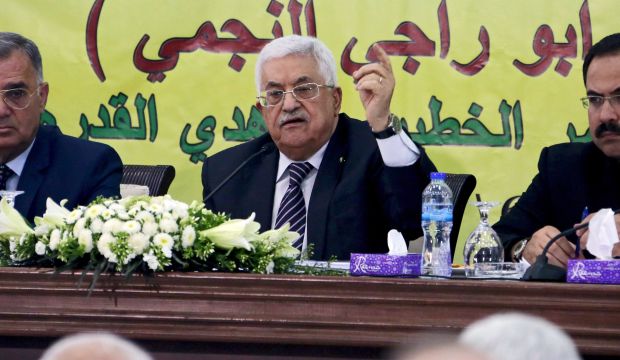
A handout photograph supplied by the Palestinian Authority (PA) shows Palestinian President Mahmoud Abbas as he addresses the Revolutionary Council in the West Bank town of Ramallah, on June 16, 2015. (EPA/Osama Falah)
Ramallah, Asharq Al-Awsat—A new Palestinian cabinet consisting of members with links to factions from across the political spectrum will replace the technocratic, national unity government that resigned on Wednesday, a presidential adviser told Asharq Al-Awsat.
Palestinian Prime Minister Rami Hamdallah resigned on Wednesday, one day after Palestinian Authority (PA) President Mahmoud Abbas said during a meeting with Fatah members that the national unity government would resign within 24 hours.
Abbas cited its inability to operate within the Hamas-dominated Gaza Strip as the reason behind its dissolution.
The announcement came following reports that Islamist Hamas had held direct talks with Israel over declaring a five-year ceasefire.
Abbas has ordered Hamdallah to form a new, “trans-factional” government, Sabri Saidam, a senior Fatah official and Abbas adviser, told Asharq Al-Awsat.
The official said: “The decision was for the government to submit its resignation and the prime minister [Hamdallah] to be tasked once again with forming a trans-factional government.”
When asked how different the new government will be especially that Hamdallah will keep his position, Saidam said cabinet members will be appointed from the Palestinian factions rather than from independent figures as was the case in the former government.
“Frankly, governments in recent years consisted of independent figures, something which impacted their performance and level of support,” he said.
The tendency, Saidam said, is that the new cabinet will consist of members affiliated with Palestinian factions “so that it can win the backing of those factions as well as be able to deliver the required performance and implement the various visions.”
Hamdallah met with Abbas in the latter’s office in Ramallah on Wednesday and the two agreed to discuss the formation of the new government during a meeting for the Palestinian Liberation Organization’s (PLO) Executive Committee on Monday.
The official said Abbas will be consulting with all factions soon, including the Islamist Hamas which rules the Gaza Strip.
But Hamas has announced its rejection of any unilateral steps aimed at dissolving the national unity government it agreed to form with Abbas last year.
The group’s spokesman Sami Abu Zuhri said on Wednesday Hamas had not been consulted over the government’s dissolution.
“Hamas rejects any one-sided change in the government without the agreement of all parties,” Zuhri told AFP.
The former Palestinian unity government was sworn in in June 2014 in a step aimed at containing a seven-year rift between the Ramallah-based Palestinian Authority and the Islamist Hamas in Gaza.
The Hamas-backed government consisted of technocrats who have no party loyalties.
